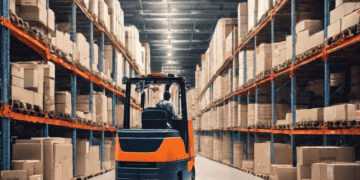Artificial intelligence (AI) continues to evolve and make significant strides across various sectors, defining the way technology mimics human behavior and surpasses it in capabilities, from autonomous vehicles to social media platforms.
Within the realm of business, AI and machine learning (ML) applications are progressively shaping innovation strategies. This technological evolution is particularly impactful in the supply chain and logistics industry, with forecasts indicating substantial economic gains. McKinsey & Company estimates potential annual economic value gains between $1.3 trillion and $2 trillion by integrating AI into supply chains. Additionally, PricewaterhouseCoopers predicts a potential contribution of nearly $15.7 trillion to the global economy from AI by 2030.
The increasing adoption of AI in supply chains is fueled by its potential to address the complexities inherent in managing global logistics networks. Properly implemented AI facilitates informed decision-making, enhancing agility and problem anticipation for companies.
AI-powered proactive systems are elevating service quality, surpassing customer expectations by ensuring timely and intact deliveries while streamlining compliance procedures, thereby reducing costs and minimizing logistical challenges.
The real potential of AI becomes apparent when combined with complementary technologies like ML, the Internet of Things (IoT), and predictive analytics, amplifying algorithm capabilities. Enhanced access to data provides companies with a comprehensive overview of their global logistics networks, signaling a fundamental shift in supply chain management and logistics strategies.
AI is poised to make a substantial impact in four key areas:
- Predictive capabilities: AI-driven demand forecasting aids in optimizing inventory levels to align with demand, thereby mitigating losses associated with inventory discrepancies. It enables proactive adjustments to the fleet size and directs resources to high-demand areas, ultimately reducing operational costs.
- Chatbots in customer support: AI-driven chatbots are reshaping customer interactions, with Accenture suggesting that 80 percent of customer engagements can be handled by bots. Examples include DHL’s integration with Amazon Alexa, allowing customers to inquire about parcel statuses and directly connect with DHL’s customer support team.
- Smart warehouses: Automation dominates smart warehouses, simplifying labor-intensive tasks and enhancing cost-effectiveness. Companies like Alibaba and Amazon have successfully implemented automation, with Amazon introducing robots that streamline order packaging alongside human workers, boosting productivity.
- Genetic algorithms in route optimization: Logistics companies leverage genetic algorithms to optimize delivery routes, crucial in minimizing time and costs. UPS utilizes Orion, a GPS tool, to plan and optimize routes based on real-time factors such as traffic conditions, resulting in substantial annual savings.
The future of AI in supply chain and logistics promises heightened efficiency, ushering in an era characterized by automated, intelligent, and more streamlined operations. These rapid changes are shaping a new paradigm in how global logistics firms manage data, execute operations, and cater to customers.
The ascent of AI and associated technologies is poised to redefine the landscape of global supply chain management, ushering in a new era of efficiency and innovation.
Explore top supply chain logistics news at The Supply Chain Report. Interested in international trade? Visit ADAMftd.com for free tools.
#ArtificialIntelligence #MachineLearning #SupplyChainInnovation #LogisticsAutomation #AIinBusiness #PredictiveAnalytics #SmartWarehouses #DHL #Alibaba #Amazon #Accenture #PricewaterhouseCoopers #McKinseyCompany #UPS #AIpoweredSystems #LogisticsOptimization #SupplyChainManagement #IoTIntegration #AIForLogistics #AIImpact #GeneticAlgorithms #CustomerSupportBots #GlobalLogistics #SupplyChainEfficiency















